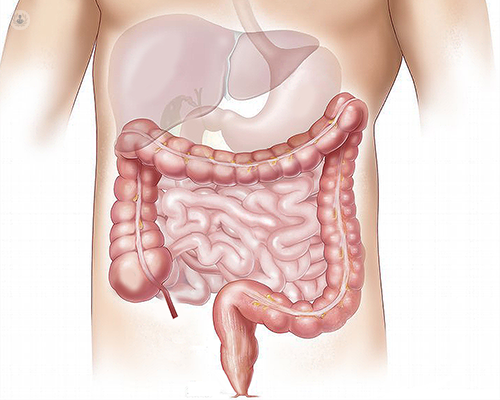Colonoscopy: What you need to know
Written in association with:Colonoscopy is one of the most effective tools in diagnosing and preventing colorectal diseases.
Here, Mr Segun Komolafe, renowned consultant general surgeon who specialises in lower gastrointestinal (GI) procedures, provides an expert insight into a colonoscopy.

Why might a patient need a colonoscopy?
A colonoscopy might be required:
- If a patient has symptoms, such as a change in their bowel habits (which might present as bleeding mixed with bowel motions).
- If a patient has a family history of problems with the bowels.
- If a patient has had a positive bowel screening result.
How is a colonoscopy performed?
A colonoscopy is typically performed under conscious sedation. The patient is given a mixture of a sedative and a painkiller, with adjustable dosages that can be increased to enhance the patient’s comfort.
During the colonoscopy, the specialist will pass a colonoscope from the back passage all the way around to the junction of the large bowel and the small bowel (called the ileocecal valve). The specialist will then assess and inspect various segments of the large bowel.
How can patients best prepare for a colonoscopy?
The preparation is typically the worst bit of the process for patients, because it involves taking a medication in the form of a bowel preparation to clean the bowels out.
The preparation is usually a mixture of salts to increase the patient’s bowel output. The general rule here is that, regardless of the specific bowel preparation, patients should take it at the right time according to the specific instructions for that particular mixture.
Patients are generally recommended to drink lots of water. In addition, it’s also generally recommended to avoid glugging and slugging the whole preparation in one go – instead, it’s better to sip it, so that the drink is ingested in small amounts. This way, patients are less prone to vomiting the preparation back up.
What can patients expect on the day of the colonoscopy? Is it painful?
All of my colonoscopies in the private sector are done at Nuffield Health Hospital Glasgow.
On the day of the colonoscopy, you are admitted to the ward, where the team of nurses will clerk you in and give you a welcome. The nurses will also check your observations and make sure you are well prepared for the procedure. You are then taken down to the endoscopy suite, where you will be given sedation and painkillers. I then perform the colonoscopy.
Is the colonoscopy painful? The short answer is that it can be uncomfortable; the bowel has nerve endings that sense stretching, so when the colonoscope is pushed around the bowel, sometimes the wall of the bowel is stretched by the colonoscope causing cramps.
What I typically tell patients is that they will have cramps that will last between 3 -10 seconds, and that they should breathe slowly through them. The cramps will then usually settle as the colonoscope traverses or crosses the particularly sensitive bit of the bowel. If it gets too painful, the dosage of the painkillers can be increased to help patients feel more comfortable.
What are the next steps after a colonoscopy?
After the procedure, you are taken to the recovery room, where you remain in observation for 5 - 30 minutes. Once you feel fine, you go up the general ward. I then come and have a discussion with you to let you know what the colonoscopy findings were and what needs to happen next.
Sedation can have an effect on short-term memory, so I personally like to give patients a paper copy of the report or send it out to them in the post 1 or 2 days later so that they have it on their records. The report will contain the findings of the procedure, what needs to happen next, as well as the follow-up for the procedure.
The patient’s GP will typically get a copy of the colonoscopy report. In addition, I always send a copy of the scope report to the patient’s base hospital as well, so that if in 5 or 10 years’ time the patient is back at the hospital having another procedure, the colonoscopy intervention is on the record.
If you would like to schedule an appointment with Mr Segun Komolafe, head on over to his Top Doctors profile today.


